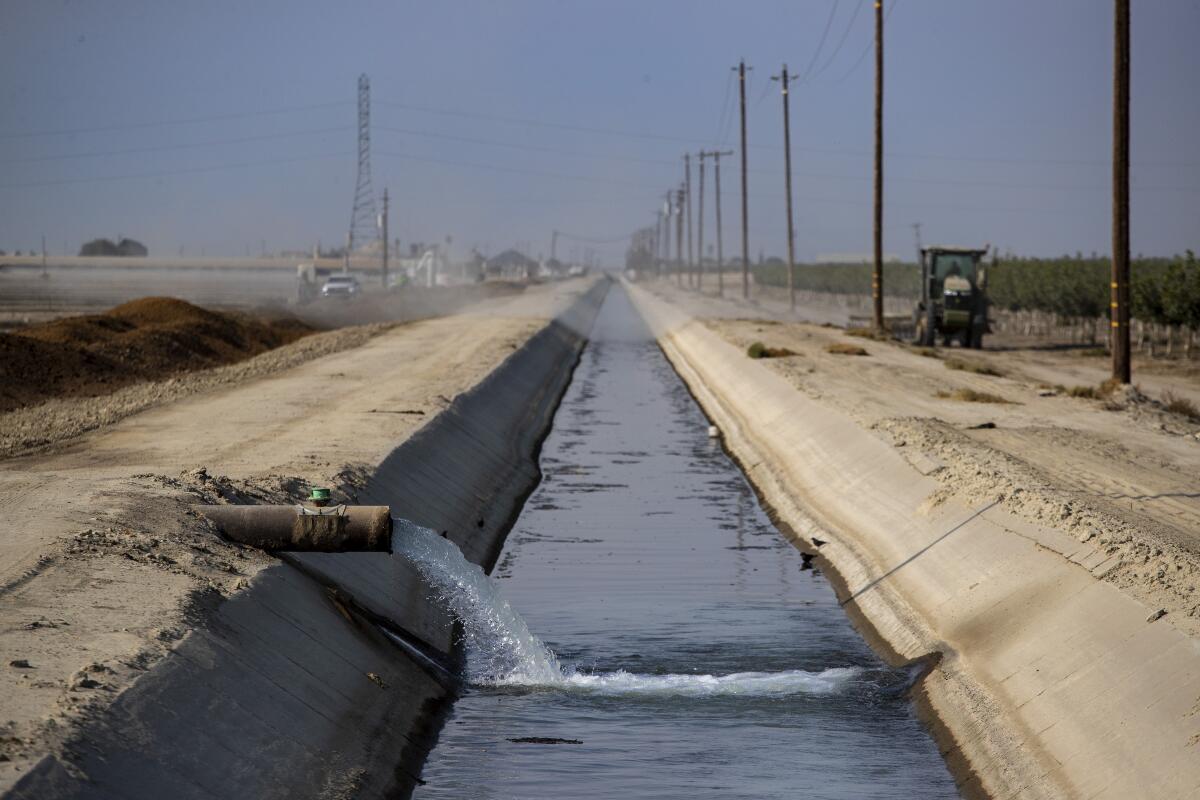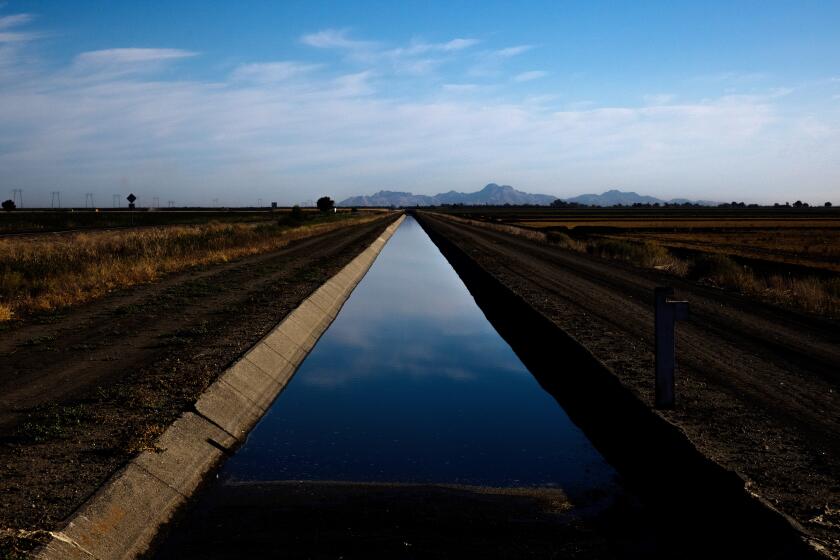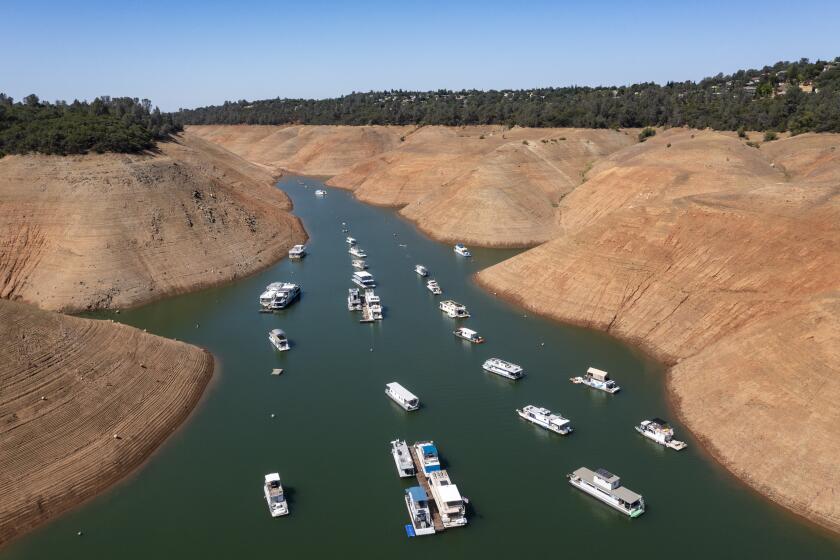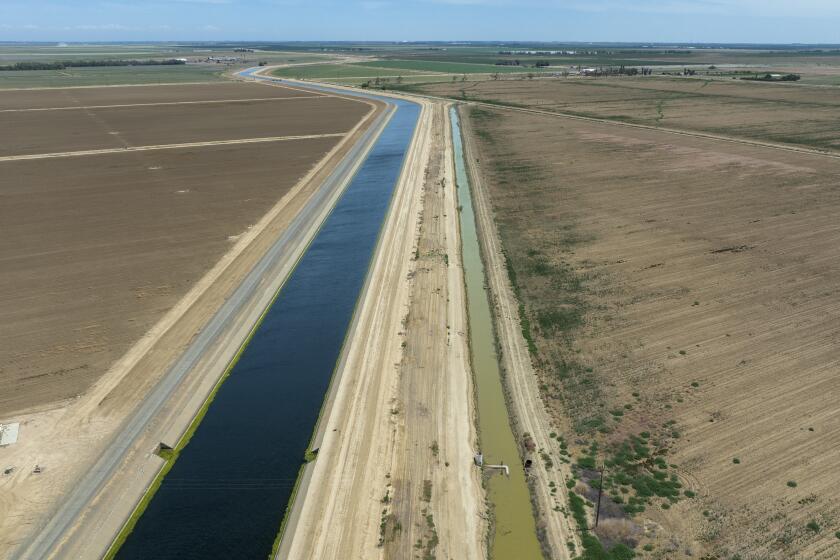Lawmakers approve plan to strengthen oversight of California water rights

- Share via
California legislators have passed a bill that aims to close a long-standing loophole in the state’s water laws: Until now, regulators haven’t had clear authority to investigate the water rights of some of the biggest water users.
These senior water right holders, with claims dating to before 1914, use roughly a third of the water that is diverted, on average, from the state’s rivers and streams. They include cities and individual landowners, as well as agricultural irrigation districts supplying farms that produce nuts, rice and other crops.
The bill, Senate Bill 389, passed in a 50-17 Assembly vote on Tuesday and is expected to be among the bills presented to Gov. Gavin Newsom for signing.
The legislation expressly authorizes the State Water Resources Control Board to investigate all water rights claims — including riparian rights and pre-1914 rights — and to determine whether the rights are valid.
“It’s about giving the water board the tools that it needs to do its work,” said Sen. Ben Allen (D-Santa Monica), who introduced the bill.
Bills advancing in the California Legislature would expand water regulators’ authority to investigate the state’s oldest water rights and penalize violators.
Allen pointed out that California’s existing water rights allocate far more water than is available in an average year, and said the State Water Board is tasked with making the system function at a time when climate change is putting growing strains on water supplies.
He said the agency needs to have this oversight authority to “make sure the system is working and that we actually have enough water for everybody.”
“This is essential to their ability to ensure that we have a sustainable water system in our state,” Allen said.
The legislation says state water regulators may investigate claims of pre-1914 or riparian water rights, issue an order for information, and, after a hearing, curb any unauthorized water use.
If an investigation reveals that a water supplier has been taking more water than it is entitled to, the State Water Board can use its enforcement powers to make that stop.
The bill is among a list of reform proposals that experts have suggested to improve oversight and management of California’s water rights system.
The bill is long overdue and provides the State Water Board “clear and unchallengeable authority to enforce the water rights system,” said Jennifer Harder, a law professor at University of the Pacific’s McGeorge School of Law.
She noted that prominent advocates of the change included the late Clifford Lee, a retired deputy attorney general who last year helped lead a group of experts in presenting reform proposals, as well as Jonas Minton, a water policy expert and environmentalist who organized the group. Both men died last year.
Lee and Minton believed the bill “was a critical first step to ensuring a sensible and cohesive water rights system” for California in the 21st century, Harder said. “The passage of this bill is a tribute to their memories.”
‘We are in a time of crisis’: Experts launch effort to update California water laws in the face of climate change and historic injustices
The bill doesn’t actually give water regulators new powers, but it adds specificity to what was previously a vague section of the state’s water law, said Nell Green Nylen, a senior research fellow at the UC Berkeley School of Law’s Wheeler Water Institute.
The State Water Board has previously gathered information about such water rights just as the bill describes, Green Nylen said. But because this power wasn’t spelled out in the law before now, she said, the agency “has almost certainly been hesitant to use it, fearing lawsuits and political backlash.”
“Imagine if a large segment of California taxpayers were not convinced the state’s Franchise Tax Board had the power to audit high-earning residents,” she said. “That wouldn’t be a good situation.”
Green Nylen and other legal experts recently published a state-funded report with recommendations for legislative and policy changes to improve oversight and management of water rights. She said the legislation partially addresses one of their recommendations, and should make it easier for the board to exercise its authority more frequently.
California’s complex system of water rights took shape starting in the mid-1800s, when settlers saw the state’s water as abundant, and when a Gold Rush prospector could stake claim to river flows simply by nailing a notice to a tree.
State officials are now working on a project to modernize California’s water rights information system by digitizing millions of paper records. Officials have said that even those extensive records in many cases don’t include original documents that show proof of pre-1914 water rights, which were grandfathered in under the 1913 Water Commission Act. That act established a permit process for rights from then on.
Some other bills that would reform water laws have stalled in the Legislature but may still be voted on next year. They include Assembly Bill 460, which would strengthen the State Water Board’s enforcement powers to stop illegal water diversions and increase fines for violators, and AB 1563, which would require local groundwater management agencies to weigh in on applications for well-drilling permits.
As calls mount to reform California’s antiquated water rights system, some are calling on lawmakers to address the system’s legacy of racism.
Some Californians would like to see deeper changes, arguing that the current water rights system should be dismantled. Those who are pushing for such an overhaul argue the water rights system is antiquated and unjust, with roots in California’s history of violence against Indigenous people and racism that prevented non-white people from securing rights in the 1800s and early 1900s.
They also argue the existing system shortchanges environmental needs and won’t be sufficient for dealing with scarcity in the future.
The bill that was approved focuses on ensuring that those with senior water rights are obeying the rules and have valid rights, but that measure, like other proposals in the Legislature, doesn’t address the system’s inequities or negative consequences, said Max Gomberg, a former State Water Board official who works with environmental advocates and has criticized the Newsom administration’s policies.
“It’s the whole system that needs to be redone,” Gomberg said.
“There is no good reason to have continued priority for stuff that was just claimed over 100 years ago, not when we face all these issues of scarcity,” Gomberg said. “Everyone who is not one of those water rights holders would benefit from a change in the system.”
He said he’d like to see the existing water rights system scrapped and replaced with a new framework that prioritizes the needs of communities, the environment and “basic food security.” He suggested that a ballot measure would be one way to remake the system.
“I think there is no effective and equitable climate adaptation in the West — this goes beyond California — without remaking it,” Gomberg said. “If it doesn’t get remade, every other thing that we do to try to adjust to our changing and aridifying climate will be insufficient.”
California tribes and environmental groups argue state officials are violating civil rights by mismanaging water. The EPA is opening an investigation.
Last year, a coalition of tribes and environmental groups sought to challenge how the state manages water by filing a civil rights complaint with the Environmental Protection Agency, accusing the State Water Board of discriminatory practices and mismanagement contributing to the ecological deterioration of the Sacramento-San Joaquin River Delta.
The EPA announced in August that it has begun an investigation.
In their complaint, the tribes and environmental groups said the decline of the ecosystem in the Delta is “rooted in white supremacy” because the rights of tribes were ignored when the water rights system was established, and because people of color were prevented from securing water rights well into the early 20th century.
They argued that out-of-date water quality standards in the Delta have led to collapsing fish populations and worsening toxic algae blooms, and demanded that the State Water Board update water quality standards.
State water officials have said they are committed to working with tribes and have taken various steps to address historical inequities, such as adopting a racial equity plan.











